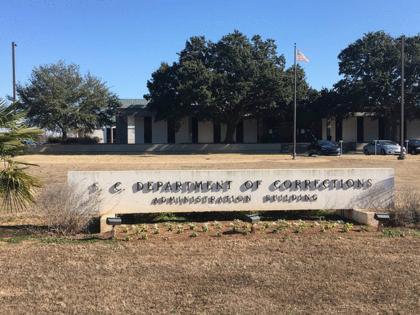Transgender South Carolina inmate asks federal judge to enforce her right to gender affirming care
Published in News & Features
COLUMBIA, S.C. — A South Carolina inmate suffering from “gender dysphoria,” who attempted self castration while struggling with daily thoughts of suicide, is asking a federal judge to force the South Carolina Department of Corrections to provide her with gender affirming-care.
Sofia Cano, 22, a transgender woman, says she’s been denied hormone therapy since being incarcerated for involuntary manslaughter in 2019. Although Corrections department medical professionals diagnosed her with gender dysphoria, the department has blocked a variety of treatments that Cano says are necessary for her mental and physical well being, according to a series of court filings.
An internationally renowned law firm, Baker Botts LLP, the ACLU of South Carolina and Brooklyn Law School’s LGBTQ Advocacy Clinic are asking a federal court to issue an injunction, compelling the department of Corrections to begin treating Cano’s condition citing constitutional violations of the 8th and 14th Amendments. The filing is the latest in a legal battle that began November 2022.
Gender dysphoria “is the feeling of discomfort or distress that might occur in people whose gender identity differs from their sex assigned at birth,” according to the Mayo Clinic. The condition is typically treated on an individualized basis that includes, but not limited to, hormone therapy, gender-affirming surgery and psychological counseling, the clinic’s website says.
“I speak from experience when I say being denied this treatment is intensely devastating and harmful,” said Jace Woodrum, executive director of the ACLU of South Carolina, who’s the first transgender person to serve as director of a state ACLU affiliate. “This case is about someone who is being denied lifesaving, medically necessary care. We would never say that was OK if someone had diabetes or cancer.”
Though Corrections officials acknowledged Cano’s motion, they declined to comment, citing pending litigation.
Gender dysphoria causes severe symptoms, including loss of appetite, a disinclination to socialize, heightened anxiety, panic attacks, depression, despondence, self-harm, self-castration and even suicide, according to a 2022 deposition by Brittany Soto, a Corrections department psychologist.
According to a Corrections policy cited in the suit, the department provides inmates with “medically necessary care ... throughout their incarceration, that align with accepted community medical standards.”
Cano told a mental health professional that she “expressed distress with not being able to transition genders” and “described in detail her plan to cut off her testicles and stated that she had tried a few months earlier but the ‘can lid’ was not sharp enough,” according to the ACLU’s motion.
“She is still suffering and is not receiving the care that she needs,” Meredith McPhail, staff attorney for the ACLU of South Carolina, told The State.
In defense of its policy in Cano’s 2022 complaint, the Corrections department cited a state budget proviso — 65.28, arguing that it was prohibited from using state funds to provide inmates with gender affirming-care. A budget proviso is a specific instruction that limits how state funds can be spent. The instruction has been in place the past several years.
In January 2024, a federal court ordered the department to evaluate Cano’s need for hormone therapy irrespective of the proviso. Upon evaluating Cano, the department retracted its 2020 diagnosis of gender dysphoria.
The state passed a law in May 2024 expressly forbidding, among other things, the use of public funds for “gender transition procedures,” including hormone therapy.
The ACLU is challenging the constitutionality of that law in a separate legal filing.
Cano’s attorneys argue that the department’s policy violates her 8th and 14th Amendment rights under the U.S. Constitution. Specifically, not providing Cano with hormone therapy violates the 8th Amendment’s prohibition against cruel and unusual punishment, according to Cano’s motion and Woodrum.
“The Eighth Amendment protects everyone from cruel and unusual punishment, such as denying health care for people’s medical needs, and that’s what’s happening in this case, and it is unconstitutional,” Woodrum said.
The ACLU says the department’s policy violates the 14th Amendment’s guarantee of equal protection, as some inmates are permitted gender-affirming care while others, like Cano, are not. Transgender inmates who received hormone therapy prior to being incarcerated also receive them in custody, according to a Corrections “freeze-frame” policy, based on budget proviso 65.28.
But following the enactment of H. 4624, no inmate will receive hormone therapy for gender transitioning with public funds, except those who received the treatment prior to the law’s May signing, according to the bill’s lead sponsor, House Majority Leader David Hiott, R-Pickens. The law does not affect other non-transgender inmates who receive hormone therapy to manage conditions such as menopause or hypertension.
“We know that hormone therapy is provided to people who are incarcerated,” Woodrum said. “We know it is provided to people who are not transgender, and we know that in some cases, when a diagnosis precedes incarceration, it is provided to transgender people. That is absolutely unequal treatment.”
To bring exposure to Cano’s case, the ACLU sought to record and publish an in-person interview with Cano, detailing her experiences. That interview, however, never happened, as federal courts upheld a Corrections policy that prohibits inmates from speaking with anyone for the purpose of publishing an interview.
_____
©2024 The State. Visit thestate.com. Distributed by Tribune Content Agency, LLC.







Comments